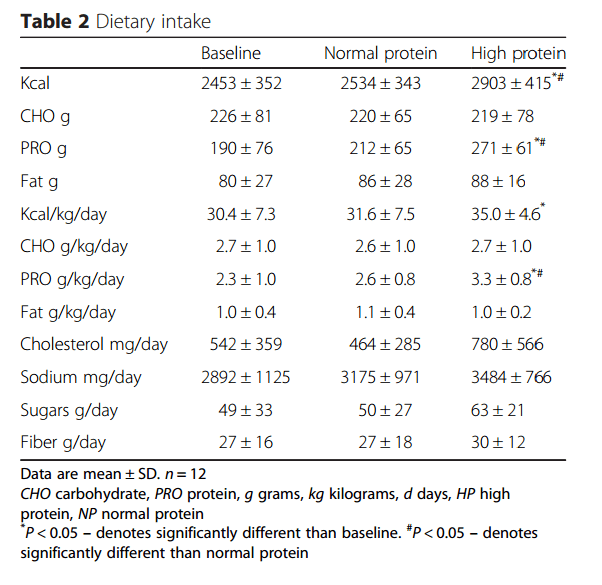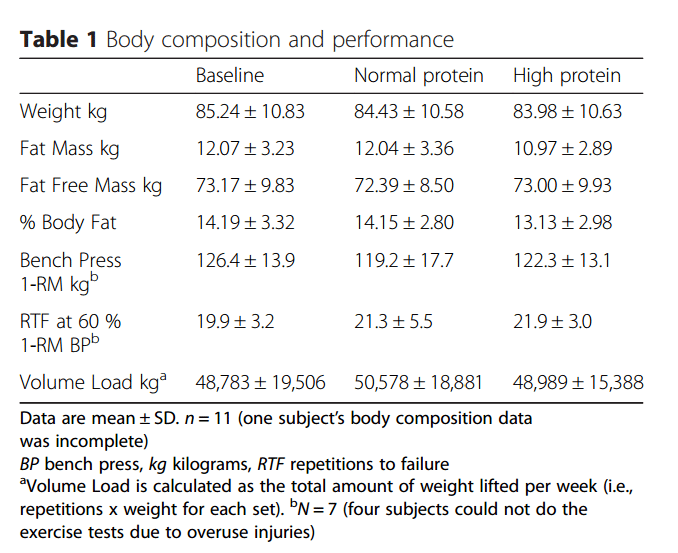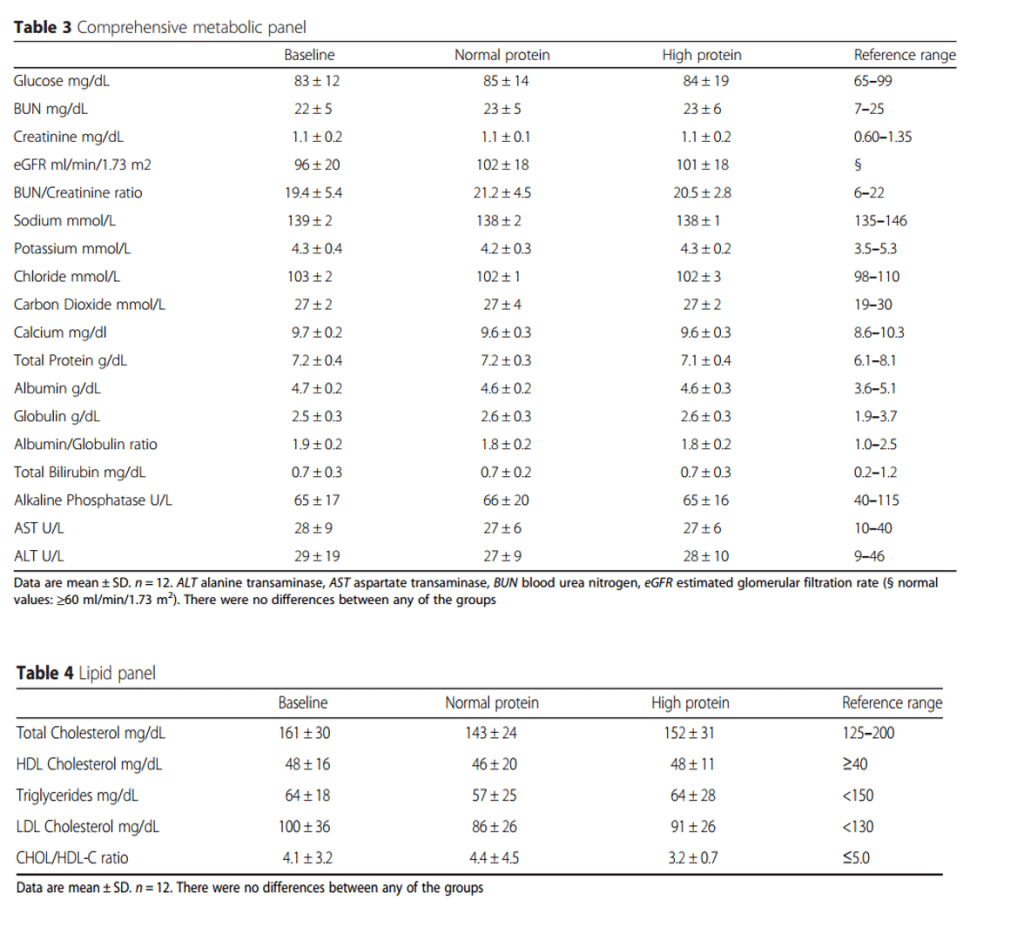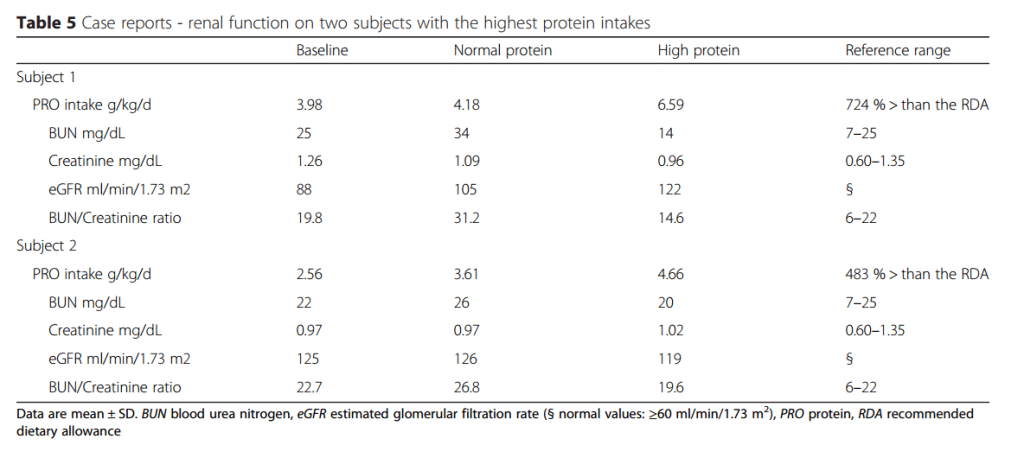“Go easy on the protein shakes bro, you are going to wreck your kidneys”
If I had a dollar for every time I heard or read that protein was going to hurt my kidneys…. well… I would probably be retired and blogging full time.
For decades, the myth has circulated that high protein intake is bad for your kidneys and other aspects of your metabolism. In past posts we have shown the effect of high protein intakes (high as in above hypercaloric) on body composition. You can read those posts here and here.
Today let’s dive into what happens to the biochemical markers and other health parameters in normally, healthy people who overfeed on protein. Basically, if we stuff you full of protein (like 4g/kg a day) what happens to your kidneys and your blood tests?
METHODS
Participants
The research team from the Antonio lab recruited twelve resistance-trained male subjects This study was a randomized crossover trial in which they consumed their habitual (i.e., normal protein) or high protein diet for two 8-week periods (My figure 1).
Figure 1
Food diary
To track food intake, subjects kept a diary (i.e., three days per week for the 16 week period; two weekdays and one weekend day) of their food intake via a smartphone app (MyFitnessPal®). The use of mobile apps for dietary self-reporting has been previously used and Every subject had previously used this mobile app (1).
Diets
As noted in previous high-protein overfeeding studies out of the Antonio lab the diets themselves were constructed as follows: during the normal diet phase the participants were instructed to maintain the same dietary and training habits over the course of the study. During the high protein diet phase, participants were instructed to consume ≥ 3 grams of protein per kg per day (or ≥3g/kg/day).
Consuming ≥3 g/kg/day from whole foods is pretty difficult so the participants on the high protein diet were able to consume commercially available whey protein that was provided to the participants
Body composition
Body composition was assessed by whole body densitometry using air displacement via the Bod Pod.
Blood analysis
The participants had blood drawn after an overnight fast at a local Quest Diagnostics™ facility on three separate occasions. A blood lipid and comprehensive metabolic panel was done. This includes the following measures: glucose, blood urea nitrogen (BUN), creatinine, glomerular filtration rate, BUN/creatinine ratio, sodium, potassium, chloride, carbon dioxide, calcium, total protein, albumin, globulin, albumin/globulin ratio, total bilirubin, alkaline phosphatase, alanine transaminase, asparate transaminase, total cholesterol, high density lipoprotein cholesterol, triglycerides, low density lipoprotein cholesterol and the total cholesterol to high density lipoprotein cholesterol ratio (1).
Training program
Again, similar to previous high protein studies done in resistance trained men from the Antonio lab, each subject followed their own strength and conditioning program. The investigators were in regular contact with each subject to ensure that each subject completed a training log. The volume load (i.e., total weight lifted per week) was determined for each 8-week period (1).
RESULTS
Diet
There were indeed differences in total energy and protein intake between the high protein, normal protein group and baseline. Briefly, during the high-protein phase of the trial the participants consumed around 400 calories more than at baseline and during the normal protein phase. During the high protein phase, almost all of the extra caloric intake came from protein (table 2 from the paper).

Body Composition
We have looked at the effect of high protein diets on body composition in great detail in two previous posts (here and here) so I will just display the tables and figures and state that there was no remarkable or significant changes in 8 weeks on the high protein diet… although the data trends follow those of the previous studies (Table 1 and Figures 1-3 from the paper)


Blood analysis
Now for the important data in this paper. Consuming a high protein diet for 8 weeks had no effect on measures included in the metabolic panel (Table 3 and 4 from the paper).

Renal Function
The authors also went a step further and examined the two individuals with the highest recorded protein intakes (4.66 and 6.59 g/kg/day) and found no deleterious effects on renal function in either individual (Table 5)

Conclusions
In a young, male, healthy, resistance training population consuming an extra 400 calories per day in protein had no remarkable changes in blood chemistry, lipids, or kidney function.
Interestingly, it has been previously postulated (and shown) that diets high in protein cause hyperfiltration and we should expect an initial increase in eGFR (glomerular filtration) (1). The results here contradict that finding. The difference is likely in the different subject populations (individuals with prehypertension or stage 1 hypertension versus healthy, normotensive participants in the current study).
For now, I think it is safe to operate under the assumption that higher protein intakes over relatively short time periods (8 weeks), especially when much of the excess comes in the form of whey protein (which was the case in this study), has no detrimental impacts on typical metabolic health parameters and kidney function

